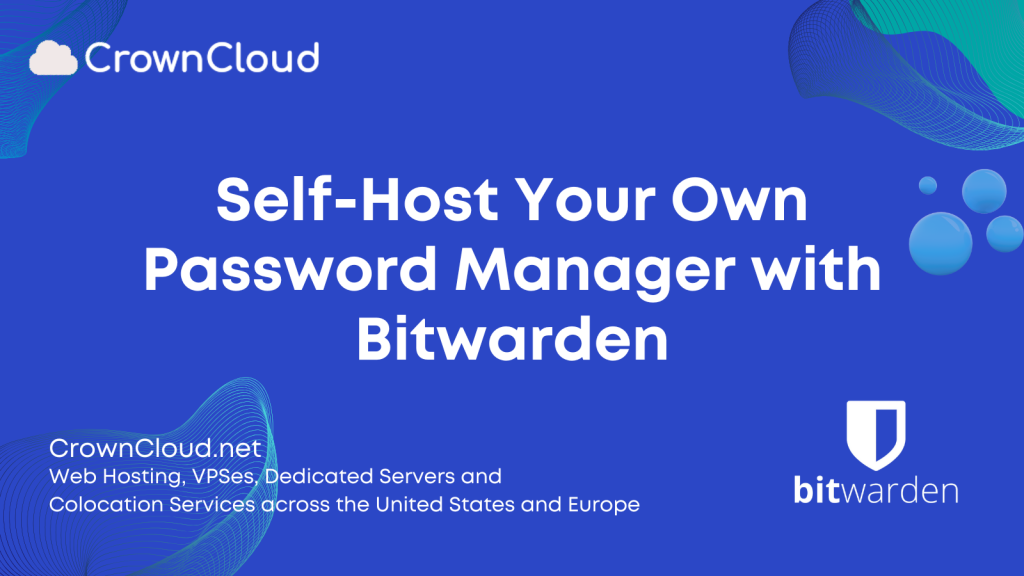Today’s article delves into Bitwarden, a powerful open-source password manager that gives you complete control by allowing self-hosting on your own server.
What is Bitwarden?
Bitwarden is a robust, open-source password manager designed for individuals, teams, and businesses that prioritize data privacy and security. By self-hosting Bitwarden on your own infrastructure, you maintain full control over your credentials and ensure sensitive information stays within your environment.

Key Features of Bitwarden
- End-to-End Encryption – All vault data is encrypted locally before being transmitted. Bitwarden uses AES-256 encryption, PBKDF2, and Argon2 hashing for maximum security.
- Cross-Platform Access – Bitwarden is accessible via web vault, native desktop apps (Windows, macOS, Linux), mobile apps (iOS/Android), and browser extensions (Chrome, Firefox, Edge, Safari, etc.).
- User & Group Management – Manage users with fine-grained access control. Supports organization groups, collections.
- Vault Health Reports – Security audit tools include checks for weak passwords, reused passwords, exposed credentials, and inactive 2FA—especially useful for teams.
- Two-Factor Authentication (2FA) – Supports TOTP-based 2FA apps (e.g., Authy, Google Authenticator), as well as Duo, YubiKey, and FIDO2 WebAuthn for enhanced security.
- Secure Sharing – Easily share login credentials, notes, cards, and identities with teams through Organizations. Control access with shared Collections and user roles.
- Command-Line Interface (CLI) – Powerful automation and scripting support with full vault control via terminal.
- API & Webhooks – Use Bitwarden’s REST API to integrate with other tools and trigger custom workflows.
- Encrypted File Attachments – Upload secure attachments (like backups, keys, or sensitive documents) with vault entries.
- Extension Ecosystem – Support for plugins and community integrations, including browser autofill and custom workflows.
Advantages of Using Bitwarden
- Self-Hosting = Full Control – Host Bitwarden on your own VPS or dedicated server to fully control access, backups, and compliance.
- Open Source & Audited – Fully open source and independently audited by trusted security firms like Cure53, with a strong community behind it.
- Scalable for Teams – Ideal for both individuals and teams. Business features include audit logs, SSO (SAML 2.0), directory sync, and custom roles.
- Affordable and Transparent – Bitwarden’s core self-hosted version is free. Premium and enterprise plans offer optional advanced features at low cost.
- Docker-Based Deployment – Uses Docker and Docker Compose for simple setup, maintenance, and portability across environments.
- Lightweight & Performant – Optimized for minimal resource usage while delivering enterprise-grade features.
System Requirements for Bitwarden
OS : Debian 12, Ubuntu 20.04/22.04
Container : Docker and Docker Compose
Memory : Minimum 2GB RAM (4GB+ recommended for production or multi-user setup)
Disk Space : Starts from 1GB (scales with attachments and user base)
CPU : 64-bit architecture (x86_64/amd64)
Web Server : Nginx or Apache (used as a reverse proxy)
SSL/HTTPS : Required, use Let’s Encrypt or your own certificate
Domain Name : Fully Qualified Domain Name with DNS pointed to your server’s IP
Installation on Linux OS (Ubuntu based OS):
You can find installation instructions in the CrownCloud Wiki Guides, and it follows:
Purchase a KVM VPS – Choose a KVM VPS plan from us that suits your requirements.
KVM SSD Plans – https://crowncloud.net/ssd_kvm.php
NVMe SSD KVM VPS Plans – https://crowncloud.net/nvme_kvm.php
AMD Ryzen SSD KVM VPS – https://crowncloud.net/ssd_amd_ryzen_kvm.php
Intel i9 12900K SSD KVM VPS Plans – https://crowncloud.net/ssd_intel_i9_kvm.php